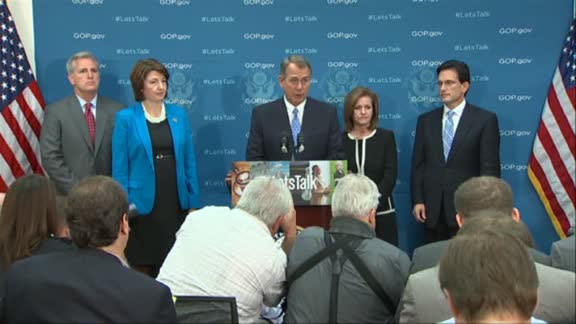Americans’ Economic Confidence Takes Plunge Not Seen Since Lehman
The Congressional wrangling that's led to a partial shutdown of the federal government has helped dent Americans' already waning confidence in the economy to a degree surpassed only by the damage done when Lehman Brothers went bankrupt in September 2008.

According to polling by Gallup, U.S. residents have had the second-biggest drop in their economic faith since the survey began in January 2008. The 12-point week-over-week decline in confidence led to a reading of negative 34, continuing a downward trend in the measure in recent weeks. The magnitude of the decrease trails only the 15-point falloff that surrounded Lehman's collapse, the key development for the global economic crisis.
While the arguing in D.C. has undoubtedly darkened our collective mood, it's important to note that the decay in confidence Gallup found comes amid what appears to be a larger downturn -- it isn't entirely about the government, even if that may be hastening the slide. Americans clearly have been feeling unhappy about their finances for several weeks based on retail sales and ebbing consumer sentiment.
Although it's tempting now to attribute weakening confidence to political intransigence, it's unlikely ordinary Americans were truly fretting in early August about the divisions of the government that might be closing in the months ahead. That's when corporations started giving serious indications that consumers were cutting back, meaning the survey data are more likely the latest sign of a wounded national psyche, one that federal lawmakers aren't doing much to heal -- not that that represents a marked change from the half decade since the financial panic.
But it does point to one unfortunate conclusion: The most notable thing the government might be doing at the moment is making us feel worse about ourselves.
Today and tomorrow
The Gallup Economic Confidence Index has two parts, one based on how Americans view current conditions and another on whether or not the economy is improving. The data show that 67% of those surveyed believe the economy is worsening, a finding that's especially notable because it's the largest percentage of the population with that position in nearly two years. Meanwhile, 28% think the economy is improving. The difference between the two yields a reading of negative 39. Regarding today's economy, more respondents feel it's bad than good -- 43% negative vs. 15% positive -- for a difference of negative 28. Combining the two components produces the overall minus 34 result.
One silver lining is that Gallup says the sharpest deterioration in our views on the economy occurred in the first three days of the government shutdown. In the following three days, attitudes stabilized. The poll results cover from Sept. 30 to Oct. 6. "This may be a positive sign that the partial government shutdown itself will not drive Americans' confidence much lower -- something the intensifying debate over the debt limit and the possibility of default could do," the polling organization says. The U.S. is set to reach its existing debt ceiling in a little more than a week, and the debate about whether to raise it again is the next fight.
Even if it's not alone in doing so, Washington does have a way of dragging us lower. Earlier this year, Capitol Hill probably contributed to another of the poll series' dreariest weeks, this one spanning late February and early March. Back then, sequestration-related budget cuts coincided with a 9-point week-over-week decrease in U.S. residents' economic confidence. In comparison, July 2011 had two weeks in which confidence slid by 8 points as Republicans and Democrats sparred over the debt ceiling that summer. Days later, in the first week of August, Standard & Poor's cut its credit rating on the United States.
"Still, economic confidence bounced back within several months of the 2011 debt crisis and the downgrading of the U.S. credit rating," Gallup says. "Likewise, confidence rebounded within weeks of the sequestration spending cuts that took effect in early March 2013. This suggests that these fiscal debates may not affect consumer confidence in the same long-term negative way that hits to the economy -- like the 2008-2009 economic recession -- do."
The positive takeaway then is that we can find a way to overcome the bickering, if our other conditions allow. The downside is they might not. Confidence has slumped badly from the late spring, when it had its best-ever reading of negative 3 in the poll's five-plus years of tracking opinions.
